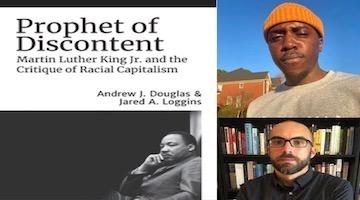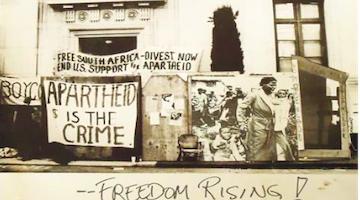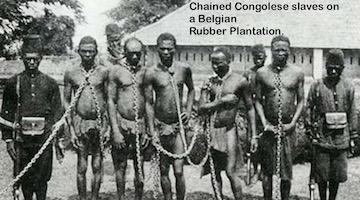Jazzman William Parker’s work is a bold art of resistance to capitalism, colonialism, racism, and the runaway train that is our present-day America.
“The role of the artist is to incite political revolution.”
In this series, we ask acclaimed authors to answer five questions about their book. This week’s featured author is Cisco Bradley. Bradley is Associate Professor of History at the Pratt Institute. His book is Universal Tonality: The Life and Music of William Parker.
Roberto Sirvent: How can your book help BAR readers understand the current political and social climate?
Cisco Bradley: Universal Tonality highlights one of the leading Black musical innovators of the past half century. Born in the South Bronx in 1952, William Parker overcame the hostile and alienating society around him that did not embrace him as an artist. But what allowed him to emerge was delving into the rich poetry, writing, art, and music of the Black Arts Movement that gave him the strength and vision to develop his own talents and to build a community of like-minded artists around him. And yet, Parker did not seek institutional support, but rather has been a voice of critique against mainstream American society through his music, deeply engaged with the social and political issues right up to the present moment. Parker believes quite seriously that art has a central role in social, political, and spiritual transformation. As Parker states in the book, “the role of the artist is to incite political revolution.” This is intended as neither hyperbole, nor metaphor. Parker has lived these words throughout his life, producing work that is deeply committed to enacting change in the present. Parker’s work is a bold art of resistance to capitalism, colonialism, racism, and the runaway train that is our present-day America.
What do you hope activists and community organizers will take away from reading your book?
The subject of Universal Tonality, bassist and composer William Parker has been a community organizer throughout his life. It is not separate from his artistic practice, but rather it is interwoven with all of his creative output. Parker is a bright-shining example of an artist who has worked to build positive community throughout his life. One thing that activists, artists, and community organizers should note is that art should not be one component of the process, it should be the process itself. In a striking and vital artistic vision like that of Parker’s, there is no separation between political movements and the cultural movements. They are one and the same. For this to fully manifest, the aim of the creative process should not be towards “a performance” or “exhibition” but rather towards community transformation through a shared experience. This is the true power of Parker’s work. He has aimed over the past five decades to enact social, cultural, and political change through his work. The goal is not to rise above the community, nor to advance beyond it, but rather to serve it and to bring people together in the process. That is one way he has steadfastly fought the inherent capitalistic mechanism to divide people with notions of privilege that one “earns” through merit. The simple idea of being the change you want to see has been central to how Parker relates to the broader community.
We know readers will learn a lot from your book, but what do you hope readers will un-learn? In other words, is there a particular ideology you’re hoping to dismantle?
This book aims to dismantle the idea that jazz is a dead art form. Some prominent American institutions present jazz as a music of the past rather than a dynamic art form that is innovative in the present. In many ways, jazz has been pushed into this position of chewing on its own tail. William Parker is one of the great examples of how the music has continued to evolve and innovate right up to the present moment. In following his work over five decades, this book examines his earliest work in the jazz lofts—institutions that emerged from the drive for self-determination of Black artists—to his critically important work with pianist Cecil Taylor, whose monumental legacy has still yet to be fully recognized. Then, the last half of the book engages with Parker’s unique artistic vision and how he conceived of various groups he formed as a bandleader including In Order to Survive, the Little Huey Creative Music Orchestra, the William Parker Quartet, the Raining on the Moon Quintet, his solo work, and his tribute projects, especially the one dedicated to Curtis Mayfield. This book also takes aim directly at the jazz conservatives that usurped much of the narrative on how we have defined jazz since the 1980s, arguing that free jazz is both a major branch on the jazz tree but also a music that has gone beyond the jazz idiom and has forged more universal and worldwide aspirations.
Who are the intellectual heroes that inspire your work?
There are a number of intellectual heroes who I saw as the guiding light when writing this book. Fred Moten’s theorizing of the “undercommons” was ever-present in my thoughts when writing this book. Robin D. G. Kelley’s many works, but especially his critical and award-winning biography of Thelonious Monk, have been a major guiding light and I consider him to be one the leading historians in the U.S. right now. George Lewis is another scholar who is of critical importance to our time period; his book on the history of the Association for the Advancement of Creative Musicians is one of the most important books ever written about American music. While it seems that many critics have misunderstood free jazz and the work of William Parker, I appreciate those who have offered keen insights through the years, so I must mention Ed Hazel as a key witness of the loft scene. I also look to artists as inspiring intellectuals, especially figures such as John Coltrane, Anthony Braxton, Cecil Taylor, Dianne McIntyre, and William Parker himself. I have also found, through my years of research, that it is often the unrecognized or forgotten sideperson on many gigs that has the greatest insights to share.
In what way does your book help us imagine new worlds?
William Parker has opened new worlds with his music constantly over the past five decades. My goal was to take the reader into Parker’s head and see out through his eyes as much as possible. He is one of the true visionaries of American music in this time period and I wanted to take readers on a tour through his way of thinking to engage with his imagination and to see the alternative realities that he paints through his music. For Parker, avant-garde is not a hip trend or some kind of genre classification. It is a way of seeing the world differently, quite necessarily, because the present ways of thinking are not serving humanity well and may well destroy life on this planet. Parker points to the filmmaker and critic Jonas Mekas who once wrote, “who cares about good art or bad art when the world is dying?” Parker embraced influences who boldly sought out new ways of thinking, new worlds of being. For example, filmmaker Stan Brakhage, who Parker considers his single greatest influence, was one of the avant-gardeists on the forefront of film in the 1960s. Parker calls us to believe these kinds of alternative ways of viewing things and to trust ourselves, to trust our own visions, when thinking, observing, writing poetry, painting, and playing music, whenever we are creating. The potency of the human imagination is endless.
Roberto Sirvent is editor of the Black Agenda Report Book Forum.
COMMENTS?
Please join the conversation on Black Agenda Report's Facebook page at http://facebook.com/blackagendareport
Or, you can comment by emailing us at comments@blackagendareport.com



















